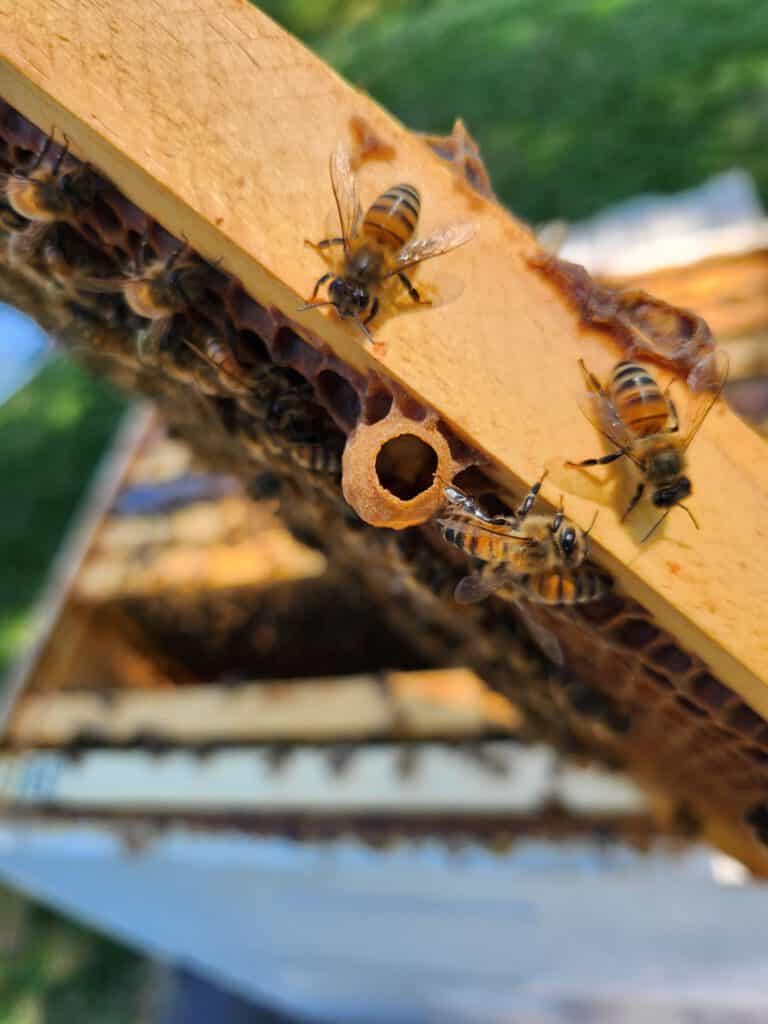Why Buy Local Honey Bees
If you are new to beekeeping, it is easy to be “blinded by the lights” with all of the advertisements for honey bees. Every supplier from everywhere markets their bees as the best, the most varroa resistant, the best foragers, etc. The Oldham County Beekeeping Association recommends buying bees from a club member, due to recurring disease, quality, and pest issues from many outside suppliers. Oldham County, Kentucky and the surrounding area has some wonderful experienced beekeepers from which to purchase your bees. You can find a list of our members who sell bees and equipment here.

How Many Hives Should I Buy?
When getting started in beekeeping a common question is, “How many hives should I start with?” It is recommended to start with two beehives, rather than one. It’s beneficial for new beekeepers as it allows for easier comparison of hive health and progress, quick identification of problems and provides a backup in case one hive suffers a setback or queen loss. If you only have one hive, and it dies, you are left with nothing.
Having a second hive enables you to compare and contrast what is happening in both hives. This rapidly increases the amount you can learn in your first season as a beekeeper. While you can learn significantly more by keeping a second hive, it doesn’t necessarily mean significantly more beekeeping work.
What Are the Benefits of Starting with Two Beehives?
Learning Through Comparison
Each hive has its own unique characteristics and behaviors, so having two colonies allows you to compare and contrast their progress. This comparison helps you learn faster and identify what’s “normal” versus what might indicate a problem.
Backup and Re-queening
If one colony loses its queen or suffers a major setback, you can move frames of brood from the stronger hive to help the weaker one, or even requeen it by using eggs from the other hive. This is a little trick often used by experienced beekeepers to have a self-sustaining apiary.
Resource Management
You can move resources (frames of brood, honey, pollen) from a strong hive to a weaker one to help it recover or strengthen it during times of need. This, again, is also an excellent method for swarm management in the spring. Some hives are just more robust and take off more quickly than others. Equalizing is a win-win situation for overly-ambitious colonies as well as those who prefer to take a bit more time to build up.
Early Problem Detection
If one hive is struggling while the other thrives, you can quickly pinpoint potential issues like a weak queen, disease or mite infestation. It also allows you to “rob from the rich and give to the poor.” If one hive is strong and the other one needs a little help, a common practice in beekeeping is to pull a frame of brood (eggs and larvae) from the strong hive and give it to the weaker hive. This practice is also called equalizing. Not only does it help the smaller colony, but it also implements a swarm management technique to help when their numbers build too quickly in the spring.
Increased Learning and Skill
If one colony loses its queen or suffers a major setback, you can move frames of brood from the stronger hive to help the weaker one, or even requeen it by using eggs from the other hive. This is a little trick often used by experienced beekeepers to have a self-sustaining apiary.
Reduces Risk of Total Loss
If you only have one hive and it dies, you have lost everything. With two, you have a better chance of having a surviving colony from which to rebuild.
What to Expect From a Local Provider?
Members will generally offer both nucleus colonies (nucs) and swarms. Nucs are generally the better product, but swarms are cheaper. Nucs contain a current queen that has been laying for at least three weeks and has proven her laying pattern. Nucs also contain brood in all stages and food. Since the club has started this local bees project in Oldham County, it has been incredibly successful. By halting the repeated cycle of shipping in packages each spring and only to have those bees perish each winter, our most successful group members now have an overabundance of bees in the spring. By purchasing your bees locally, you are setting yourself up for a more successful beekeeping journey.
The bulk of these locally-resourced bees are mutts from our local breeding and
capturing programs. Most club members are selecting for varroa resistance to varying degrees of success. We also seek easy-to-handle bees with gentle temperaments. The individual bee suppliers can much better inform you of the qualities of their bees. They are also accessible to answer questions and help you develop management plans. Our local producers want you to be successful!
If you have more questions we encourage you to attend a meeting and talk to our experienced beekeepers.
You can find meeting information on our events calendar. Otherwise you can contact the local providers if you have specific questions from our nucs, queens, and equipment sales page.
